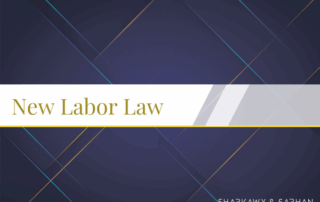1st of March, 2013
FDRS Regulatory Update
Keywords: Financial Institutions, Banking & Finance
Recently, EFSA has taken a rigorous approach regarding the issuance and conversion of foreign depository receipts (“FDRs”) (including GDRs and ADRs). This came after the recent acquisition involving the Global Depository Receipts (“GDRs”) of Orascom for Construction and Industries (“Orascom”) by a Dutch company – OCI N.V. in consideration for a share swap to GDRs holders of OCI N.V. shares. EFSA issued three new decisions regulating FDRs in a stricter manner.
Our reading to the new decisions suggests that recent transactions involving FDRs, in particular the acquisition of the OCI Egypt GDRs, has highlighted the rather scant regulatory regime of the FDRs corresponding to the shares listed on the Egyptian Stock Exchange (“EGX”).
EFSA has based its measures on three axes with a view of maintaining more control over FDRs and avoid structures utilizing EFSA’s lack of control over cross-jurisdictional FDR transactions.
First, Limiting the Maximum Portion of the Share Capital of an EGX Listed Company Traded in the Form of FDRs
The board of EFSA issued its decision no. (8) (27 February 2013) providing that FDRs must not represent more than one third of the share capital of the issuing listed company. Speculations suggest that this decision has been in response to the recent acquisition by OCI N.V. of the OCI Egypt GDRs which utilized a structure where more than 75% of the share capital of OCI Egypt was acquired offshore in the form of GDRs outside EFSA’s supervision or control.
The issuance provisions of the decision explicitly state that it will come into effect as of the day following its publishing in the official gazette. It does not address, however, how the EGX will apply the new limitation to existing listed companies that already have listed FDRs in excess of one third of its issued capital.
Secondly, Restricting Egyptian Brokers and Portfolio Managers to Execute FDRs Trades only Through EFSA Pre-approved Brokers
The board of EFSA issued its decision no. (9) (27 February 2013) requiring Egyptian brokerage companies to obtain a special license to trade in FDRs on behalf of their customers. These licensed brokers must abide by additional compliance and reporting obligations to obtain and maintain the FDRs trading license. Brokerage companies that do not have this special license from EFSA are absolutely banned from dealing in FDRs, whether directly or by using one of the EFSA pre-approved brokerage companies. Furthermore, Egyptian portfolio management companies are banned from making any trades over FDRs except through an EFSA pre-approved brokerage company.
The objective of this decision is to limit the Egyptian pipeline for FDR trades to be only through the EFSA pre-approved brokers that are subject to the additional compliance and reporting requirements enabling EFSA higher degree of supervision, tracking and control over the FDR trades coming out of the Egyptian market.
There is no explicit grace period for compliance with these new rules. In addition, the issuance provisions of the decision explicitly state that it will come into effect as of the day following its publishing in the official gazette, and hence it will take immediate effect.
Thirdly, Rules for Issuance and Conversion of FDRs Corresponding to EGX Listed Shares
It was announced on 3rd of March 2013 that EFSA has circulated to both the EGX and the Egyptian central depository (Misr for Central Clearing Depository and Registry – “MCDR”) rules for issuance and conversion of FDRs corresponding to shares listed on the EGX. The circular is not published, but there is a press release on the website of EFSA briefing the salient principles set out by these rules. These new rules impose several controls targeting the issuing company, the offshore depository bank, and its local agent/custodian. These new controls revolve around imposing reporting, disclosure and compliance obligations on the issuing company, the offshore depository bank and its local agent/custodian.
Pursuant to Chapter 12 of the Executive Regulations of the Capital Market Law no. 95 for 1992 (the “Takeover Rules”), any purchaser who acquires or wishes to acquire one third of the share capital or voting powers of a public company, either directly or indirectly, is mandated to submit a mandatory tender offer (“MTO”) for all the shares of the target public company. In practice, EFSA and the EGX were using their authority to block any transaction that will result in exceeding the aforementioned thresholds until an MTO is made. Recently, EFSA was alerted to a gap in the Takeover Rules, whereby it was possible for a purchaser to acquire the majority of the shares of a public company by acquiring its offshore traded FDRs while the MTO is made only as a post acquisition step. The purpose of the new rules is to ensure that EFSA can impose an MTO prior to the acquisition of one third of the share capital or voting powers of a public company.
Accordingly, the recent rules referred to in the EFSA press release were issued specifically to fill in the regulatory gap in connection with offshore acquisition structures involving FDRs including, inter alia:
- acquisitions through purchase offers on FDRs shall be ineffective, where the FDRs must first be converted into shares in order for the purchase offer to take place directly on the ordinary shares;
- in case of acquisition on the FDRs, the depository bank and its local agent/custodian will have to keep the shares corresponding to the issued FDRs and will have to abide by the Takeover Rules before executing any conversion; and
- MCDR will have to stop the registration of transfer of ownership and settlement of any transactions executed in breach of the Takeover Rules and will have to notify EFSA and the issuing company of the same.
Given that the language of the new rules for FDRs issuance and conversion are not yet available, the above are only the broad principles that were summarized in EFSA’s statement without much detail on the mechanisms of application thereof.
Although it is not yet clear how the abovementioned decisions/regulations will affect the acquisition transaction of OCI Egypt and the prospected mandatory tender offer for the remainder of its ordinary shares listed on the EGX; the ultimate effect of the rules is that it will not be possible to adopt a similar acquisition structure as the one followed in the OCI Egypt deal in the future.
Our reading to the new decisions suggests that recent transactions involving FDRs, in particular the acquisition of the OCI Egypt GDRs, has highlighted the rather scant regulatory regime of the FDRs corresponding to the shares listed on the Egyptian Stock Exchange (“EGX”).
EFSA has based its measures on three axes with a view of maintaining more control over FDRs and avoid structures utilizing EFSA’s lack of control over cross-jurisdictional FDR transactions.
First, Limiting the Maximum Portion of the Share Capital of an EGX Listed Company Traded in the Form of FDRs
The board of EFSA issued its decision no. (8) (27 February 2013) providing that FDRs must not represent more than one third of the share capital of the issuing listed company. Speculations suggest that this decision has been in response to the recent acquisition by OCI N.V. of the OCI Egypt GDRs which utilized a structure where more than 75% of the share capital of OCI Egypt was acquired offshore in the form of GDRs outside EFSA’s supervision or control.
The issuance provisions of the decision explicitly state that it will come into effect as of the day following its publishing in the official gazette. It does not address, however, how the EGX will apply the new limitation to existing listed companies that already have listed FDRs in excess of one third of its issued capital.
Secondly, Restricting Egyptian Brokers and Portfolio Managers to Execute FDRs Trades only Through EFSA Pre-approved Brokers
The board of EFSA issued its decision no. (9) (27 February 2013) requiring Egyptian brokerage companies to obtain a special license to trade in FDRs on behalf of their customers. These licensed brokers must abide by additional compliance and reporting obligations to obtain and maintain the FDRs trading license. Brokerage companies that do not have this special license from EFSA are absolutely banned from dealing in FDRs, whether directly or by using one of the EFSA pre-approved brokerage companies. Furthermore, Egyptian portfolio management companies are banned from making any trades over FDRs except through an EFSA pre-approved brokerage company.
The objective of this decision is to limit the Egyptian pipeline for FDR trades to be only through the EFSA pre-approved brokers that are subject to the additional compliance and reporting requirements enabling EFSA higher degree of supervision, tracking and control over the FDR trades coming out of the Egyptian market.
There is no explicit grace period for compliance with these new rules. In addition, the issuance provisions of the decision explicitly state that it will come into effect as of the day following its publishing in the official gazette, and hence it will take immediate effect.
Thirdly, Rules for Issuance and Conversion of FDRs Corresponding to EGX Listed Shares
It was announced on 3rd of March 2013 that EFSA has circulated to both the EGX and the Egyptian central depository (Misr for Central Clearing Depository and Registry – “MCDR”) rules for issuance and conversion of FDRs corresponding to shares listed on the EGX. The circular is not published, but there is a press release on the website of EFSA briefing the salient principles set out by these rules. These new rules impose several controls targeting the issuing company, the offshore depository bank, and its local agent/custodian. These new controls revolve around imposing reporting, disclosure and compliance obligations on the issuing company, the offshore depository bank and its local agent/custodian.
Pursuant to Chapter 12 of the Executive Regulations of the Capital Market Law no. 95 for 1992 (the “Takeover Rules”), any purchaser who acquires or wishes to acquire one third of the share capital or voting powers of a public company, either directly or indirectly, is mandated to submit a mandatory tender offer (“MTO”) for all the shares of the target public company. In practice, EFSA and the EGX were using their authority to block any transaction that will result in exceeding the aforementioned thresholds until an MTO is made. Recently, EFSA was alerted to a gap in the Takeover Rules, whereby it was possible for a purchaser to acquire the majority of the shares of a public company by acquiring its offshore traded FDRs while the MTO is made only as a post acquisition step. The purpose of the new rules is to ensure that EFSA can impose an MTO prior to the acquisition of one third of the share capital or voting powers of a public company.
Accordingly, the recent rules referred to in the EFSA press release were issued specifically to fill in the regulatory gap in connection with offshore acquisition structures involving FDRs including, inter alia:
- acquisitions through purchase offers on FDRs shall be ineffective, where the FDRs must first be converted into shares in order for the purchase offer to take place directly on the ordinary shares;
- in case of acquisition on the FDRs, the depository bank and its local agent/custodian will have to keep the shares corresponding to the issued FDRs and will have to abide by the Takeover Rules before executing any conversion; and
- MCDR will have to stop the registration of transfer of ownership and settlement of any transactions executed in breach of the Takeover Rules and will have to notify EFSA and the issuing company of the same.
Given that the language of the new rules for FDRs issuance and conversion are not yet available, the above are only the broad principles that were summarized in EFSA’s statement without much detail on the mechanisms of application thereof.
Although it is not yet clear how the abovementioned decisions/regulations will affect the acquisition transaction of OCI Egypt and the prospected mandatory tender offer for the remainder of its ordinary shares listed on the EGX; the ultimate effect of the rules is that it will not be possible to adopt a similar acquisition structure as the one followed in the OCI Egypt deal in the future.

FDRS Regulatory Update
1 March, 2013
Keywords: Financial Institutions, Banking & Finance
Recently, EFSA has taken a rigorous approach regarding the issuance and conversion of foreign depository receipts (“FDRs”) (including GDRs and ADRs). This came after the recent acquisition involving the Global Depository Receipts (“GDRs”) of Orascom for Construction and Industries (“Orascom”) by a Dutch company – OCI N.V. in consideration for a share swap to GDRs holders of OCI N.V. shares. EFSA issued three new decisions regulating FDRs in a stricter manner.
Our reading to the new decisions suggests that recent transactions involving FDRs, in particular the acquisition of the OCI Egypt GDRs, has highlighted the rather scant regulatory regime of the FDRs corresponding to the shares listed on the Egyptian Stock Exchange (“EGX”).
EFSA has based its measures on three axes with a view of maintaining more control over FDRs and avoid structures utilizing EFSA’s lack of control over cross-jurisdictional FDR transactions.
First, Limiting the Maximum Portion of the Share Capital of an EGX Listed Company Traded in the Form of FDRs
The board of EFSA issued its decision no. (8) (27 February 2013) providing that FDRs must not represent more than one third of the share capital of the issuing listed company. Speculations suggest that this decision has been in response to the recent acquisition by OCI N.V. of the OCI Egypt GDRs which utilized a structure where more than 75% of the share capital of OCI Egypt was acquired offshore in the form of GDRs outside EFSA’s supervision or control.
The issuance provisions of the decision explicitly state that it will come into effect as of the day following its publishing in the official gazette. It does not address, however, how the EGX will apply the new limitation to existing listed companies that already have listed FDRs in excess of one third of its issued capital.
Secondly, Restricting Egyptian Brokers and Portfolio Managers to Execute FDRs Trades only Through EFSA Pre-approved Brokers
The board of EFSA issued its decision no. (9) (27 February 2013) requiring Egyptian brokerage companies to obtain a special license to trade in FDRs on behalf of their customers. These licensed brokers must abide by additional compliance and reporting obligations to obtain and maintain the FDRs trading license. Brokerage companies that do not have this special license from EFSA are absolutely banned from dealing in FDRs, whether directly or by using one of the EFSA pre-approved brokerage companies. Furthermore, Egyptian portfolio management companies are banned from making any trades over FDRs except through an EFSA pre-approved brokerage company.
The objective of this decision is to limit the Egyptian pipeline for FDR trades to be only through the EFSA pre-approved brokers that are subject to the additional compliance and reporting requirements enabling EFSA higher degree of supervision, tracking and control over the FDR trades coming out of the Egyptian market.
There is no explicit grace period for compliance with these new rules. In addition, the issuance provisions of the decision explicitly state that it will come into effect as of the day following its publishing in the official gazette, and hence it will take immediate effect.
Thirdly, Rules for Issuance and Conversion of FDRs Corresponding to EGX Listed Shares
It was announced on 3rd of March 2013 that EFSA has circulated to both the EGX and the Egyptian central depository (Misr for Central Clearing Depository and Registry – “MCDR”) rules for issuance and conversion of FDRs corresponding to shares listed on the EGX. The circular is not published, but there is a press release on the website of EFSA briefing the salient principles set out by these rules. These new rules impose several controls targeting the issuing company, the offshore depository bank, and its local agent/custodian. These new controls revolve around imposing reporting, disclosure and compliance obligations on the issuing company, the offshore depository bank and its local agent/custodian.
Pursuant to Chapter 12 of the Executive Regulations of the Capital Market Law no. 95 for 1992 (the “Takeover Rules”), any purchaser who acquires or wishes to acquire one third of the share capital or voting powers of a public company, either directly or indirectly, is mandated to submit a mandatory tender offer (“MTO”) for all the shares of the target public company. In practice, EFSA and the EGX were using their authority to block any transaction that will result in exceeding the aforementioned thresholds until an MTO is made. Recently, EFSA was alerted to a gap in the Takeover Rules, whereby it was possible for a purchaser to acquire the majority of the shares of a public company by acquiring its offshore traded FDRs while the MTO is made only as a post acquisition step. The purpose of the new rules is to ensure that EFSA can impose an MTO prior to the acquisition of one third of the share capital or voting powers of a public company.
Accordingly, the recent rules referred to in the EFSA press release were issued specifically to fill in the regulatory gap in connection with offshore acquisition structures involving FDRs including, inter alia:
- acquisitions through purchase offers on FDRs shall be ineffective, where the FDRs must first be converted into shares in order for the purchase offer to take place directly on the ordinary shares;
- in case of acquisition on the FDRs, the depository bank and its local agent/custodian will have to keep the shares corresponding to the issued FDRs and will have to abide by the Takeover Rules before executing any conversion; and
- MCDR will have to stop the registration of transfer of ownership and settlement of any transactions executed in breach of the Takeover Rules and will have to notify EFSA and the issuing company of the same.
Given that the language of the new rules for FDRs issuance and conversion are not yet available, the above are only the broad principles that were summarized in EFSA’s statement without much detail on the mechanisms of application thereof.
Although it is not yet clear how the abovementioned decisions/regulations will affect the acquisition transaction of OCI Egypt and the prospected mandatory tender offer for the remainder of its ordinary shares listed on the EGX; the ultimate effect of the rules is that it will not be possible to adopt a similar acquisition structure as the one followed in the OCI Egypt deal in the future.
Our reading to the new decisions suggests that recent transactions involving FDRs, in particular the acquisition of the OCI Egypt GDRs, has highlighted the rather scant regulatory regime of the FDRs corresponding to the shares listed on the Egyptian Stock Exchange (“EGX”).
EFSA has based its measures on three axes with a view of maintaining more control over FDRs and avoid structures utilizing EFSA’s lack of control over cross-jurisdictional FDR transactions.
First, Limiting the Maximum Portion of the Share Capital of an EGX Listed Company Traded in the Form of FDRs
The board of EFSA issued its decision no. (8) (27 February 2013) providing that FDRs must not represent more than one third of the share capital of the issuing listed company. Speculations suggest that this decision has been in response to the recent acquisition by OCI N.V. of the OCI Egypt GDRs which utilized a structure where more than 75% of the share capital of OCI Egypt was acquired offshore in the form of GDRs outside EFSA’s supervision or control.
The issuance provisions of the decision explicitly state that it will come into effect as of the day following its publishing in the official gazette. It does not address, however, how the EGX will apply the new limitation to existing listed companies that already have listed FDRs in excess of one third of its issued capital.
Secondly, Restricting Egyptian Brokers and Portfolio Managers to Execute FDRs Trades only Through EFSA Pre-approved Brokers
The board of EFSA issued its decision no. (9) (27 February 2013) requiring Egyptian brokerage companies to obtain a special license to trade in FDRs on behalf of their customers. These licensed brokers must abide by additional compliance and reporting obligations to obtain and maintain the FDRs trading license. Brokerage companies that do not have this special license from EFSA are absolutely banned from dealing in FDRs, whether directly or by using one of the EFSA pre-approved brokerage companies. Furthermore, Egyptian portfolio management companies are banned from making any trades over FDRs except through an EFSA pre-approved brokerage company.
The objective of this decision is to limit the Egyptian pipeline for FDR trades to be only through the EFSA pre-approved brokers that are subject to the additional compliance and reporting requirements enabling EFSA higher degree of supervision, tracking and control over the FDR trades coming out of the Egyptian market.
There is no explicit grace period for compliance with these new rules. In addition, the issuance provisions of the decision explicitly state that it will come into effect as of the day following its publishing in the official gazette, and hence it will take immediate effect.
Thirdly, Rules for Issuance and Conversion of FDRs Corresponding to EGX Listed Shares
It was announced on 3rd of March 2013 that EFSA has circulated to both the EGX and the Egyptian central depository (Misr for Central Clearing Depository and Registry – “MCDR”) rules for issuance and conversion of FDRs corresponding to shares listed on the EGX. The circular is not published, but there is a press release on the website of EFSA briefing the salient principles set out by these rules. These new rules impose several controls targeting the issuing company, the offshore depository bank, and its local agent/custodian. These new controls revolve around imposing reporting, disclosure and compliance obligations on the issuing company, the offshore depository bank and its local agent/custodian.
Pursuant to Chapter 12 of the Executive Regulations of the Capital Market Law no. 95 for 1992 (the “Takeover Rules”), any purchaser who acquires or wishes to acquire one third of the share capital or voting powers of a public company, either directly or indirectly, is mandated to submit a mandatory tender offer (“MTO”) for all the shares of the target public company. In practice, EFSA and the EGX were using their authority to block any transaction that will result in exceeding the aforementioned thresholds until an MTO is made. Recently, EFSA was alerted to a gap in the Takeover Rules, whereby it was possible for a purchaser to acquire the majority of the shares of a public company by acquiring its offshore traded FDRs while the MTO is made only as a post acquisition step. The purpose of the new rules is to ensure that EFSA can impose an MTO prior to the acquisition of one third of the share capital or voting powers of a public company.
Accordingly, the recent rules referred to in the EFSA press release were issued specifically to fill in the regulatory gap in connection with offshore acquisition structures involving FDRs including, inter alia:
- acquisitions through purchase offers on FDRs shall be ineffective, where the FDRs must first be converted into shares in order for the purchase offer to take place directly on the ordinary shares;
- in case of acquisition on the FDRs, the depository bank and its local agent/custodian will have to keep the shares corresponding to the issued FDRs and will have to abide by the Takeover Rules before executing any conversion; and
- MCDR will have to stop the registration of transfer of ownership and settlement of any transactions executed in breach of the Takeover Rules and will have to notify EFSA and the issuing company of the same.
Given that the language of the new rules for FDRs issuance and conversion are not yet available, the above are only the broad principles that were summarized in EFSA’s statement without much detail on the mechanisms of application thereof.
Although it is not yet clear how the abovementioned decisions/regulations will affect the acquisition transaction of OCI Egypt and the prospected mandatory tender offer for the remainder of its ordinary shares listed on the EGX; the ultimate effect of the rules is that it will not be possible to adopt a similar acquisition structure as the one followed in the OCI Egypt deal in the future.
Insights
Disclaimer
The information included in this publication/client alert is not legal advice or any other advice. Publications and client alerts on this site are current as of their date of publication and do not necessarily reflect the present law or regulations. Please feel free to contact us should you need any legal advice related to the publication/client alert. Sharkawy & Sarhan (the “Firm”) will not be held liable for any compensatory, special, direct, incidental, indirect, or consequential damages, exemplary damages or any damages whatsoever arising out of or in connection with the use of the data, information or material included in this publication/client alert. This publication/client alert may contain links to third-party websites that are not controlled by the Firm. These third-party links are made available to you as a convenience and you agree to use these links at your own risk. Please be aware that the Firm is not responsible for the content or services offered by and of third-party websites, links as included in the Newsletter nor are we responsible for the privacy policy or practices of third-party websites links included therein.
Authorization of Use
The data, information, and material included in this publication/client alert are solely owned by the Firm. All rights related are reserved under the laws of the Arab Republic of Egypt. No part of this publication/client alert can be redistributed, copied, or reproduced without the prior written consent of the Firm.




